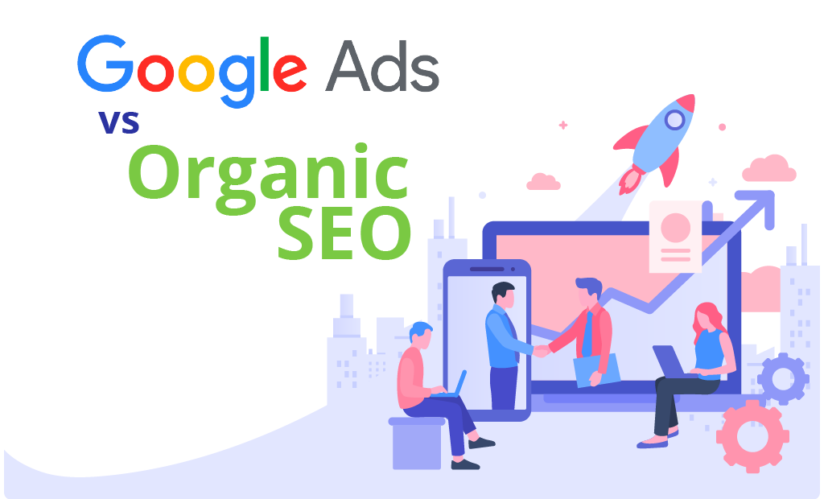
Are Google Ads Better Than Organic SEO?
Are Google Ads Better Than Organic SEO?
A common question that advertisers asks is, “how long before I see results with Google Ads?” Of course, small businesses have a larger stake because they don’t usually have the budget to sustain a long-term campaign.
Google claims that you would see results from three to seven days, but there are several factors that come into play:
- Your budget
- The kind of industry you are in
- How long have you been in the business
- Your goals
But there is a difference between results and maturity.
Let’s just say that it is not uncommon for first-time advertisers to run a Google Adwords campaign for 12 months.
The keyword here is PATIENCE.
Google says that you will earn $2 for every $1 spent on the campaign. But you will not likely earn that immediately. The good news is when it all comes together, doubling your revenues is a conservative estimate.
However, if you don’t have the patience to wait for weeks or months, there is a better way.
Mixing Paid and Organic Search
For a long time, there was a running debate on which one is better in giving a click-through-rate (CTR). The answer is not always black and white.
Let us first discuss the difference between the two.
Organic
When you key in a word or phrase on the Google search bar, the results that you see below the sponsored content are known as “organic results.” The method used to get your website to the top of the list is known as search engine optimization.
The goal is to get to the top three for the particular keyword. For instance, if consumers search for “non-stick pan,” your website should be the first they see on the search engine results page (SERP).
If not, at least get your website on the first page.
Why is this important?
Because 9 out of 10 consumers do not go to the second page at all.
The SERP will list down ten websites for each query. Well, nine, actually. Wikipedia will likely be in there along with the results. So, you are essentially fighting for limited spots on the first page.
The top-ranking website will get 30-40% of the traffic. The runner-up will get 10-12% of the click, while the third place will get 5-8%.
The 10th website listed on the first page will get about 2-3% of the traffic.
The websites listed on page 2 will be fighting for scraps.
When you are in the 11th place of the SERP, you’ve already lost more than 90% of your potential customers.
Paid Search
Now let’s talk about Paid Search… There are obviously many paid advertising channels, but for the sake of this article we will only cover Adwords.
In contrast to the Organic Search, Paid Search is essentially advertisements. Those advertisers PAID to be placed at the top of a page. It is also called pay-per-click (PPC) marketing.
Businesses pay for certain keywords, so their websites appear on top when customers run a query using those keywords.
You can clearly differentiate paid ads because they are located on top of the organic results, and marked by a clear border or shade.
Now, some might think that nobody clicks on those ads!
If you say that, you could be wrong.
Just because one may personally think they are annoying doesn’t mean they are not effective.
- In 2017, about 7-10% viewed PPC negatively. By 2018, the number is down to just 1%
- The top 3 ad spots corner 50% of the traffic
- Traffic funneled through PPC results in 50% more conversion compared to organic search
- Google Ads reach 8 in 10 Internet users
Both organic search and paid searches have their respective strengths and weaknesses.
Here are the benefits of organic search:
- Credibility — The high ranking means relevance, authority, and credibility. This would be the perception of consumers. After all, Google would not lead them astray, would it? As a result, they are more likely to click on the first website they see.
- Sustainability — With Google Ads, you only rank high as long as you are willing to pay for the campaign. With organic search, the ranking is evergreen (with the assumption that you adopted best practices in reaching the high ranking).
- Easier to maintain — It is more difficult to drop out of the top 3 rank than to get there. Once you get high rankings for particular keywords, some websites will need a crowbar to pry you out of your position.
- Authority — The search engines already afforded you the authority status. All it needs is a little tweaking for you to continue to own the keywords.
On the downside, you will need to develop patience because the results will take time. SEO tactics and content marketing also need a lot of trial and error to determine what works or not.
Let’s talk about the benefits of paid search:
- Accelerate timeframe — With paid search, you get instant gratification. You will get the number of traffic specified in your ad order. You will get the top position after you place the ad.
- Better CTR(click-through-rate) — If people are willing to click on the ad, the chances of them being ready to spend increase greatly.
- Reach out to your target market — You do not have to use the shotgun approach–where you pull the trigger and hope you hit something. A paid Google Ad can be calibrated to reach the intended audience.
The drawback is the cost. It is typically more expensive to run a PPC campaign. If the keywords are competitive, you may have to engage in a bidding war. The second disadvantage is that it is not evergreen. Your high ranks only last as long as you are willing to pay for it.
The Verdict:
So, which is Better?
Despite their different methods, organic and paid searches have similar goals–boosting traffic and conversion.
An integrated approach will allow you to enjoy the best of both worlds. You get instant results with PPC marketing and evergreen results from SEO or content marketing. The PPC will also give you better conversions and sales, while organic will give you credibility and authority from both search engines and your target market.
You also reduce the costs by maximizing each of the method’s strengths. By combining the two approaches, you establish your brand identity better and multiply your site’s visibility quicker.
So why settle for one method when you can reap the benefits of both? Utilizing both paid search and organic will give you a well-rounded Google strategy and is a solid investment in your company.
For Help with Your Earned and Paid Marketing Strategy Contact Us @ 972.850.7312

 Previous Post
Previous Post


